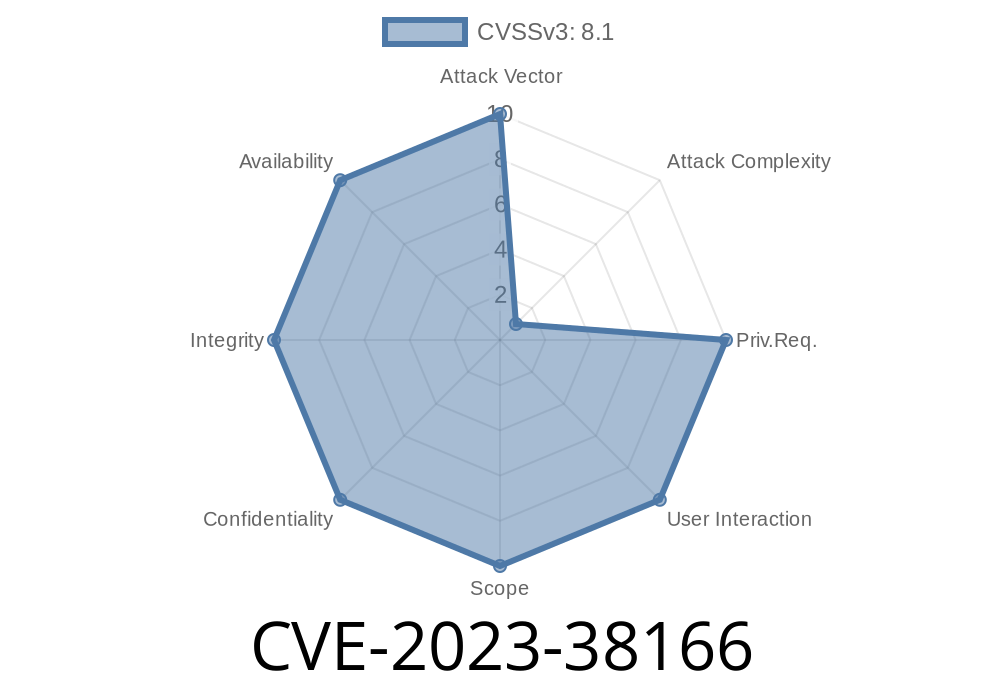On August 8, 2023, Microsoft disclosed a critical vulnerability tracked as CVE-2023-38166, affecting its implementation of the Layer 2 Tunneling Protocol (L2TP). The flaw allows remote code execution (RCE), which is one of the most severe classes of attack, enabling an attacker to run malicious code on vulnerable systems remotely. Despite the technical nature, this post aims to break down the mechanics of this vulnerability and provide actionable insight in simple, clear language.
Quick Facts
- CVE: CVE-2023-38166
Understanding L2TP
L2TP (Layer 2 Tunneling Protocol) is often used to support VPNs, allowing secure data transmission between networks. It encapsulates data for secure shipment, but if the implementation is faulty, it can be an entry point for attackers.
The Vulnerability
CVE-2023-38166 exploits how Windows processes specially crafted L2TP traffic. In short, an attacker can send malformed L2TP packets to a target system's L2TP service, causing a buffer overflow, which can then be leveraged to run arbitrary code.
Summary from Microsoft
> "An attacker could send a specially crafted set of packets to a targeted Windows server running the Routing and Remote Access Service (RRAS) configured as a VPN server, which could result in RCE on the RRAS server machine."
Source: Microsoft Security Response Center
1. Prerequisites
- The target must run Windows L2TP/IPsec VPN server (i.e., Routing and Remote Access Service enabled and listening).
2. Exploit Mechanics
The attacker sends crafted L2TP Control Messages with header values designed to overflow a buffer in the L2TP service. By precisely controlling this data, the attacker can overwrite memory structures, including the instruction pointer (EIP/RIP), redirecting code execution to attacker-supplied code ("shellcode").
3. Simplified Attack Flow
sequenceDiagram
participant Attacker
participant TargetServer (RRAS with L2TP)
Attacker->>TargetServer: Send specially crafted L2TP packet
TargetServer-->>Attacker: None (server processes packet)
Note right of TargetServer: Buffer overflow occurs
Malicious code executed
Here's a simplified code sample for sending a crafted packet (for educational purposes only)
import socket
# L2TP typically uses UDP port 1701
TARGET_IP = "TARGET_IP"
L2TP_PORT = 1701
# Example of a malformed L2TP control message to trigger buffer overflow
malformed_packet = b'\x00\x02\x00\x01' # Fake L2TP header (truncated example)
malformed_packet += b'A' * 1024 # Overflow buffer with 'A's
sock = socket.socket(socket.AF_INET, socket.SOCK_DGRAM)
sock.sendto(malformed_packet, (TARGET_IP, L2TP_PORT))
print(f"Sent crafted packet to {TARGET_IP}:{L2TP_PORT}")
sock.close()
> WARNING: This code is a harmless proof-of-concept that does not execute shellcode or exploit the vulnerability. Never use code like this on unauthenticated, real-world targets.
Create new user accounts with admin rights.
This is particularly dangerous for organizations depending on Windows VPN servers exposed to the internet.
Mitigation & Patching
- Patch Immediately: Microsoft fixed this issue in August 2023 Patch Tuesday. Apply all recent Windows updates.
- Restrict Access: Use firewalls to block access to UDP/1701 unless strictly necessary.
Official Resources & Links
- Microsoft Official Advisory
- NVD Details
- Microsoft Update Catalog
- L2TP RFC 2661
Conclusion
CVE-2023-38166 highlights how network services, even ones as established as L2TP, remain attractive attack vectors. Always patch promptly, restrict exposure, and audit configuration. Network-facing services, especially VPNs, require special care—remember, attackers are always scanning for the next unpatched host.
Stay safe and secure your edge.
Disclaimer: This post is for educational purposes only and should not be used for illegal activities.
*Written exclusively for this request. For the latest updates, always consult the official Microsoft resources.*
Timeline
Published on: 10/10/2023 18:15:18 UTC
Last modified on: 10/12/2023 22:19:14 UTC
